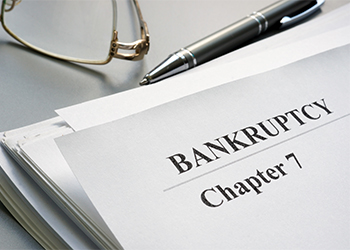How Does Chapter 7 Affect Your Co-Signers' Financial Obligations?
Dec. 26, 2024
 At Vivona Pandurangi, PLC, many of our clients worry that their Chapter 7 bankruptcy filing could affect those who co-signed loans with them.
At Vivona Pandurangi, PLC, many of our clients worry that their Chapter 7 bankruptcy filing could affect those who co-signed loans with them.
If you're in this situation, you should know that while Chapter 7 bankruptcy can discharge many of your financial obligations and offer a clean slate, it doesn’t necessarily relieve co-signers of their responsibility. Understanding the consequences for your co-signers is an important step in preparing for bankruptcy.
Legal processes like these can be complicated, so seeking professional advice is often the best course of action. At Vivona Pandurangi, PLC, our attorneys serve clients across Virginia, including Falls Church, Alexandria, Arlington, Fairfax, Manassas, Prince William, and Loudoun.
Understanding Chapter 7 Bankruptcy and Co-Signers
When you filed a loan application with a co-signer, the lender viewed that individual as a secondary source of repayment. That means if you default on the debt, the lender has the legal right to pursue the co-signer for payments.
While Chapter 7 bankruptcy can relieve you of personal liability for certain debts, it does not discharge the financial responsibility of your co-signer. This means that:
If the loan is discharged in your bankruptcy, the lender can and likely will demand repayment from your co-signer.
Co-signers’ credit scores can be impacted when they must cover missed payments or if the debt falls into delinquency.
Co-signers may face legal action and collection efforts from creditors attempting to recoup the remaining debt balance.
Co-signers may also have to deal with tax implications, as the forgiven debt could be considered taxable income.
Chapter 7 bankruptcy can give you a fresh financial start, but you must be transparent with your co-signers about the challenges they might face.
How Chapter 7 Protects You (Not Your Co-Signer)
Chapter 7 protects you if you are struggling financially. Once your debts are discharged, creditors can no longer pursue you for repayment. However, your co-signers will not benefit from this protection unless they file for bankruptcy.
For example, consider a co-signed car loan. After filing for Chapter 7, the following might occur:
Your personal obligation to repay the loan is wiped out.
Since you no longer have an obligation to repay the loan, the creditor might target the co-signer instead, demanding payment or repossessing the car.
The co-signer may have limited options, either to pay off the debt entirely or negotiate with the lender.
Chapter 7 bankruptcy lets you discharge unsecured debts like credit cards or medical bills, removing your legal responsibility to repay them. While your liability is eliminated, any secured debt, such as a mortgage or car loan, may still involve asset repossession if payments are not made. Additionally, the automatic stay granted after filing immediately halts most collection efforts against you but does not extend to actions against your co-signer.
Proactive communication can prevent straining relationships with those who have co-signed for you. You could also explore legal alternatives, such as reaffirmation agreements to protect your co-signers.
Virginia Laws Governing Chapter 7 and Co-Signers
Virginia follows federal bankruptcy laws but has several provisions that affect residents. For instance, Virginia's exemption laws allow specific property to be kept safe from creditors during bankruptcy, potentially influencing whether a co-signed asset, like a car or home, gets liquidated.
However, when it comes to co-signers, Virginia law adheres to federal standards—meaning your discharge in Chapter 7 bankruptcy does not extend to co-signers. Creditors can pursue co-signers for repayment, as they are equally liable for the debt in the lender’s eyes.
If you’re based in Virginia and worried about the implications for a co-signer, Vivona Pandurangi, PLC offers experienced guidance that will reassure both you and your co-signers.
How to Mitigate Co-Signer Liability
If you're concerned about the consequences your Chapter 7 bankruptcy could have on a co-signer, here are a few strategies that could reduce their financial burden:
Reaffirmation agreements: Work with a creditor to reaffirm the debt, meaning you agree to remain responsible post-bankruptcy. While this won’t discharge the obligation, it can protect your co-signer.
Pay off the debt: If possible, address and resolve the co-signed debt before filing. Reducing or eliminating the balance owed can minimize the financial strain placed on your co-signer.
Agree to a contribution plan: Establish an arrangement with your co-signer where you contribute to the debt repayment even after filing for Chapter 7.
Loan consolidation: For multiple co-signed loans, consider consolidating debt to make repayment more manageable for you and your co-signer.
Seek professional advice: A financial advisor or bankruptcy attorney can help you develop strategies to protect your co-signer. They will also give you tailored advice and assist with negotiations for legal compliance and minimizing liability.
Refinance the loan: If possible, explore refinancing options to remove the co-signer from the debt. Shifting the loan solely into your name can relieve the co-signer of responsibility.
Bankruptcy Attorneys in Falls Church and Alexandria
At Vivona Pandurangi, PLC, we make legal assistance accessible and affordable for Virginia residents. We strive to reduce complications and avoid extra expenses, saving you time and money. Our legal team takes a thorough and results-driven approach, especially in bankruptcy cases, creditor's rights, and civil litigation.
Our firm serves clients across Virginia, including Falls Church, Alexandria, Arlington, Fairfax, Manassas, Prince William, and Loudoun. Contact us today for dedicated legal support.
